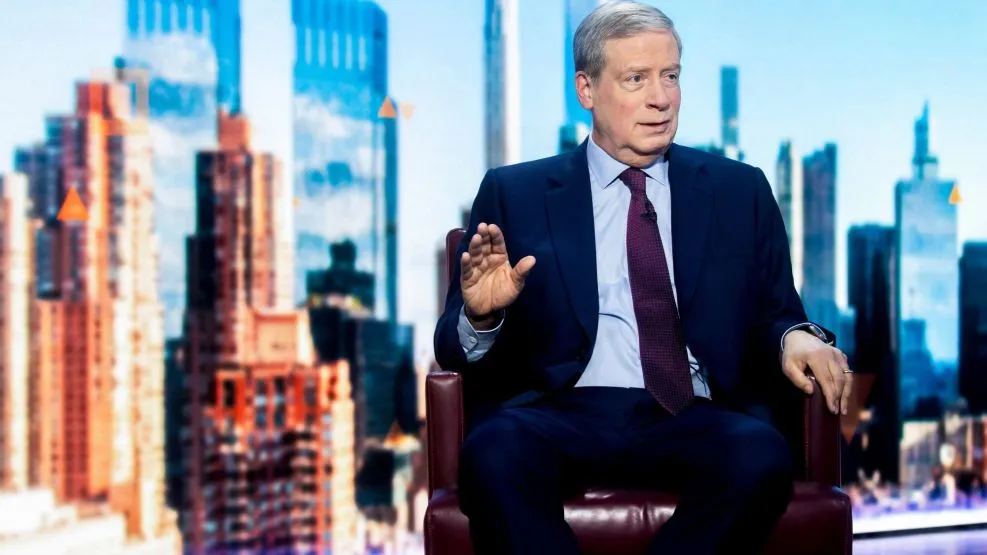The CEO of Duquesne Family Office, Stanley Druckenmiller, suggested that the market is signaling a strong potential for Donald Trump to win the upcoming presidential election after a recent interview with Bloomberg. Druckenmiller, known for his astute financial insights, pointed out several indicators, noting that industries likely benefit from Trump’s deregulatory policies already outperform others.
“I must say, in the last twelve days, the market and the inside of the market is very convinced Trump is going to win,” Druckenmiller told Bloomberg. “You can see it in the bank stocks, you can see it in crypto, you can even see it in DJT, his social media company.”
The billionaire investor’s comments come just under three weeks before Election Day, fueling the speculation that the markets predict a Trump victory. “If you put a gun to my head,” Druckenmiller continued, “I would have to guess Trump is the favorite to win the election.” He underscored that he doesn’t have a firm conviction on the election’s outcome but trusts market signals as a more reliable forecast than conventional polling.
Druckenmiller’s assessment contrasted mainstream media narratives and polling data, which continue to show a tight race between Trump and Vice President Kamala Harris. However, Druckenmiller dismissed the relevance of these polls, stating, “Who knows what these polls even mean? No one even responds to them anymore.”
He elaborated on the idea that certain sectors of the market, which would benefit most from Trump’s policy agenda, have surged in recent weeks.
“Throughout the whole [market], the industries that are deregulated — if we had deregulation — will benefit from Trump, and they are outperforming the others,” he said. His remarks highlight the growing optimism among investors in banking, cryptocurrency, and other industries that thrive under reduced government intervention.
The hedge fund manager pointed out a historical precedent, comparing the current market trends to those observed during Ronald Reagan’s successful 1980 campaign. “I remember how right the market was on Ronald Reagan in 1980, despite what the pundits were saying,” Druckenmiller said. He implied that the same undercurrent of market optimism is favoring Trump this time, much like it did for Reagan four decades ago.
Moreover, Druckenmiller blasted a Democratic “blue sweep” of Congress and the presidency, calling it “extremely unlikely.” He emphasized that even if Harris were to win the presidency, the likelihood of Republicans reclaiming the Senate is high. “A red sweep is much more likely,” Druckenmiller predicted, suggesting that voters supporting Trump would be inclined to keep Republicans in control of Congress as well.
“A red sweep,” he added, “could result in a potentially stronger economy for three to six months.” However, Druckenmiller cautioned that a “bad response” from fixed-income markets could stifle the stock market’s growth, underscoring the delicate balance between political outcomes and financial stability.
Despite his confidence in Trump’s market appeal, Druckenmiller admitted that he might not support either Trump or Harris in the election. “I’ll probably write in someone,” he said, distancing himself from a formal endorsement of either candidate. His comments reflect his broader concerns about Trump’s tariffs and negotiation tactics with foreign countries, which he believes could harm U.S. competitiveness in the long term.
That said, Druckenmiller was clear in his critique of Harris, whom he described as “much worse” due to her anti-business stance and regulatory zeal. He argued that Harris’s policies would introduce a level of government intervention that would suffocate economic growth, particularly in industries like energy and tech.
The billionaire also criticized Harris’s approach to industrial policy, which he feared would lead to greater government control and less innovation. “Both candidates are unified on some things, like industrial policy,” Druckenmiller said but added that Harris’s approach would be “detrimental” to American businesses, particularly smaller companies.
Druckenmiller’s remarks are part of a larger pattern of market-driven skepticism toward the Biden-Harris administration’s regulatory approach. Many investors, like Druckenmiller, view Trump as the candidate who can deliver a more business-friendly environment, despite his flaws. “At the end of the day,” Druckenmiller said, “Trump’s deregulatory policies have proven beneficial to the economy.”
While Druckenmiller stopped short of endorsing Trump, his analysis of market trends revealed insight into how financial experts view the upcoming election. “The market is usually right about these things,” he said. And if the market’s current trajectory is any indication, a second Trump presidency could be on the horizon.


